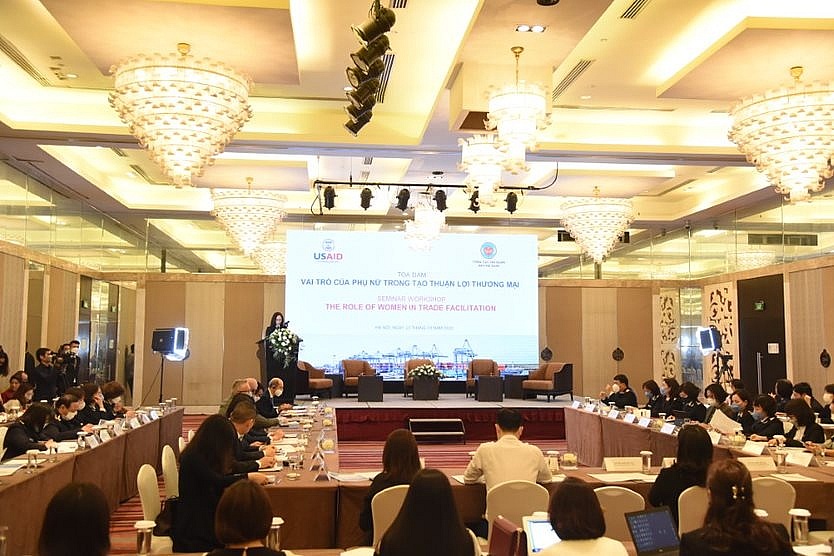Hurdles on the road to elevate women's roles in trade facilitation
 |
| Representatives at the meeting |
In modern society, female leaders tend to invest directly and trade in the retail sector, social services, education and healthcare, food, household services, commodities for kids, essential goods and fields that male leaders are less interested in due to low-profit margins. This creates diversity in commodities and services for society.
Speaking at the seminar, Le Thi Ngoc Lien from the USAID Trade Facilitation Programme said, "More female participation in trade not only benefits the women and their families but also adds value to the economy. At the same time, it increases social inclusion and sustainable development."
Although women’s inclusion in business has been shown to have significant benefits, they face obstacles compared to their male counterparts. International research indicates that laws and trade initiatives often ignore the specific needs of women. Many lack access to information, meaning that they face considerable challenges doing business, according to Lien.
“Fact is that some female leaders don’t even know that their commodities enjoy tariff exemptions, so they continue to do business via third parties, which increases expenses and risks,” Lien added.
During the workshop, female leaders from the General Department of Customs in Vietnam (GDVC) and 50 other import-export enterprises discussed the potential for greater gender awareness to meet the needs of women and their businesses. They highlighted the requirement for information and training on customs procedures.
A survey by the USAID Trade Facilitation Programme shows that several regulations have signs of discrimination towards small- and medium-sized enterprises led by women. Government policies do not focus enough on meeting their needs and many face barriers when completing customs procedures.
The survey results also illustrate that the recruitment policies at customs offices still tend to favour men, and there is a lack of help for women to balance their work and family lives.
According to USAID, two primary factors contribute to shortening the time span of women’s professional life, circumscribing their opportunities to reach positions of leadership. The first one is child and family responsibilities that are primarily borne by women.
The other factor is that the Labour Code's regulation requires women to retire five years earlier than men during a period that is typically the pinnacle in a career. While men are jump-starting careers by attending training from their mid-20s to 30s, women are consumed with maternity leave and caring for young children. As a result, women’s careers often get a slower start.
Besides this, sex-disaggregated data is not collected or analysed in Vietnam for trade-related activities such as involvement in customs clearing procedures by people in the private and public sectors, ownership of businesses engaged in trade, and participation in the annual Customs Satisfaction Survey.
In order to improve the above situation, it is necessary to organise gender training courses, according to Lien.
An approach that is grounded in objective evidence and coupled with capacity building through technical tasks such as data collection and analysis could help internalise and sustain gender integration. Collecting sex-disaggregated data for USAID's programme activities could also provide the necessary first step in addressing gender-based disparities.
What the stars mean:
★ Poor ★ ★ Promising ★★★ Good ★★★★ Very good ★★★★★ Exceptional
Themes: Empowering Women
- Female influence still to be attained
- Shaping Vietnam's corporate future: female board members show business excellence
- Nestlé Vietnam contributes to elevating the role of women across the supply chain
- Empowering female leaders in tech: insights and aspirations shared at KPMG Tech Innovator 2023
- Brighter Path programme hosts empowerment meeting for ethnic minority girls
Related Contents
Latest News
More News
- Tet event in Japan celebrates success of 14th National Party Congress (January 25, 2026 | 10:04)
- 14th National Party Congress wraps up with success (January 25, 2026 | 09:49)
- Congratulations from VFF Central Committee's int’l partners to 14th National Party Congress (January 25, 2026 | 09:46)
- List of newly-elected members of 14th Political Bureau announced (January 23, 2026 | 16:27)
- 14th Party Central Committee unanimously elects To Lam as General Secretary (January 23, 2026 | 16:22)
- List of members of 14th Party Central Committee announced (January 23, 2026 | 09:12)
- Highlights of fourth working day of 14th National Party Congress (January 23, 2026 | 09:06)
- Press provides timely, accurate coverage of 14th National Party Congress (January 22, 2026 | 09:49)
- Press release on second working day of 14th National Party Congress (January 22, 2026 | 09:19)
- Minister sets out key directions to promote intrinsic strength of Vietnamese culture (January 22, 2026 | 09:16)

 Tag:
Tag:


























 Mobile Version
Mobile Version